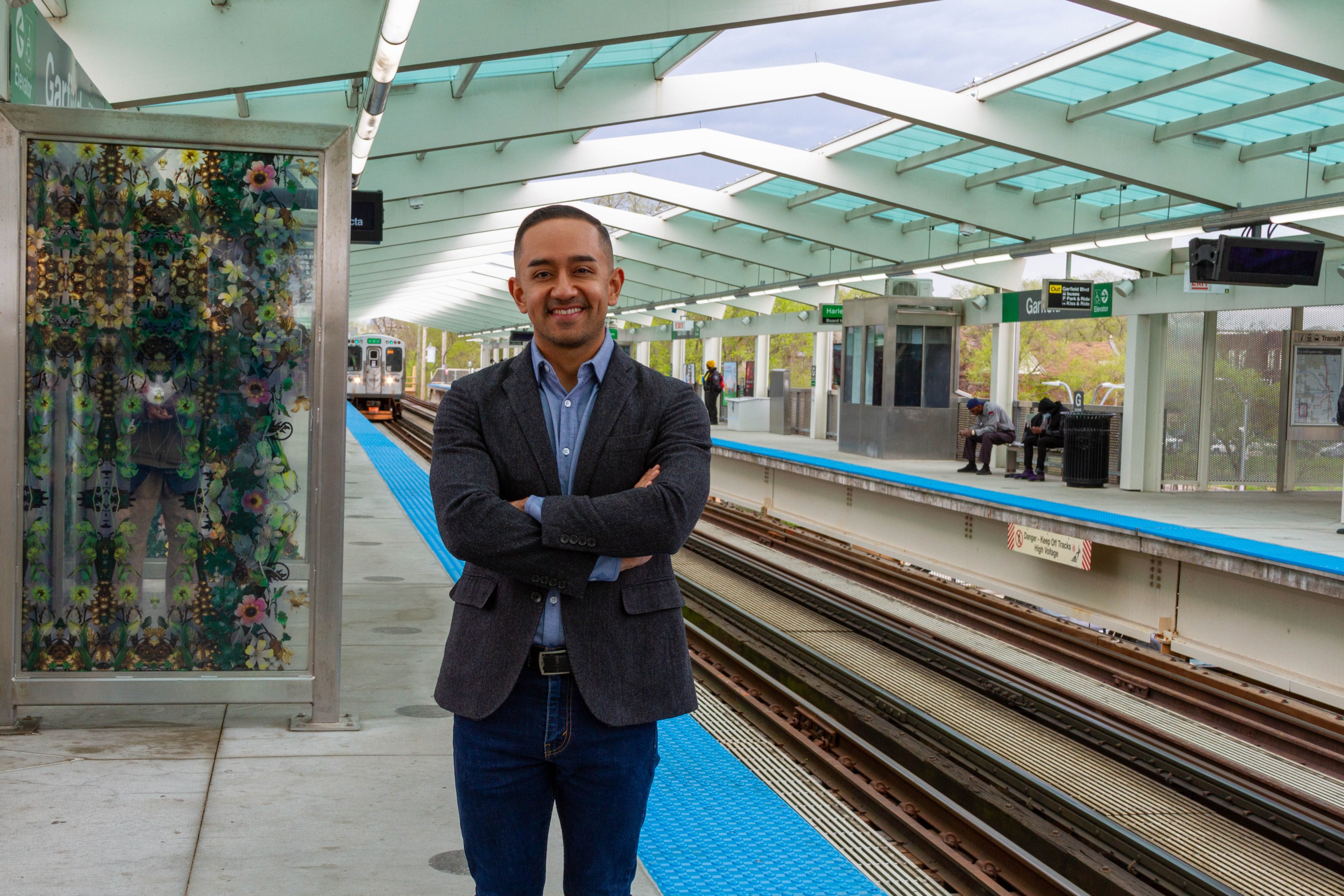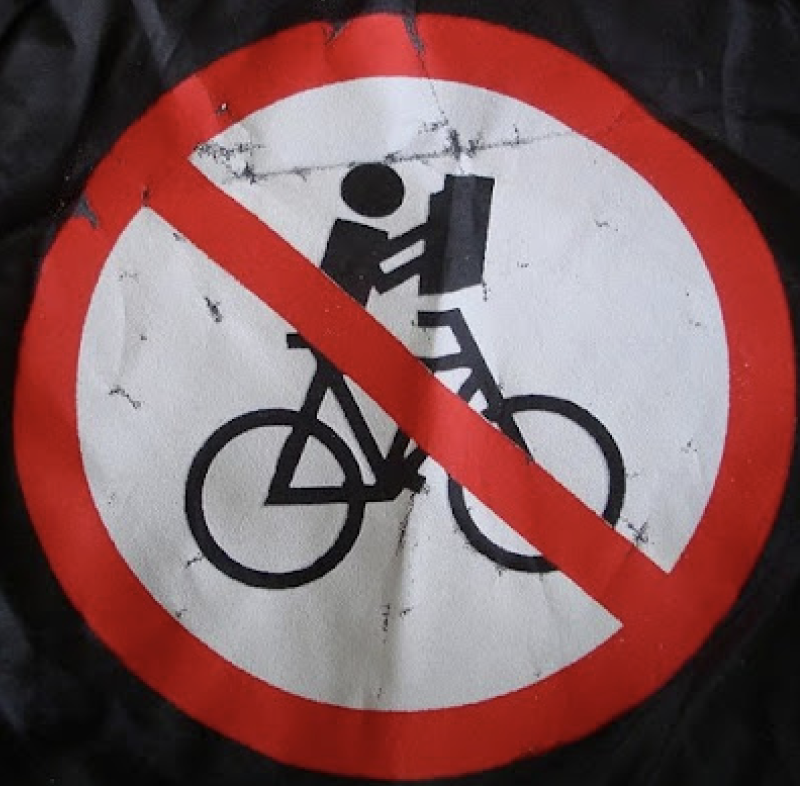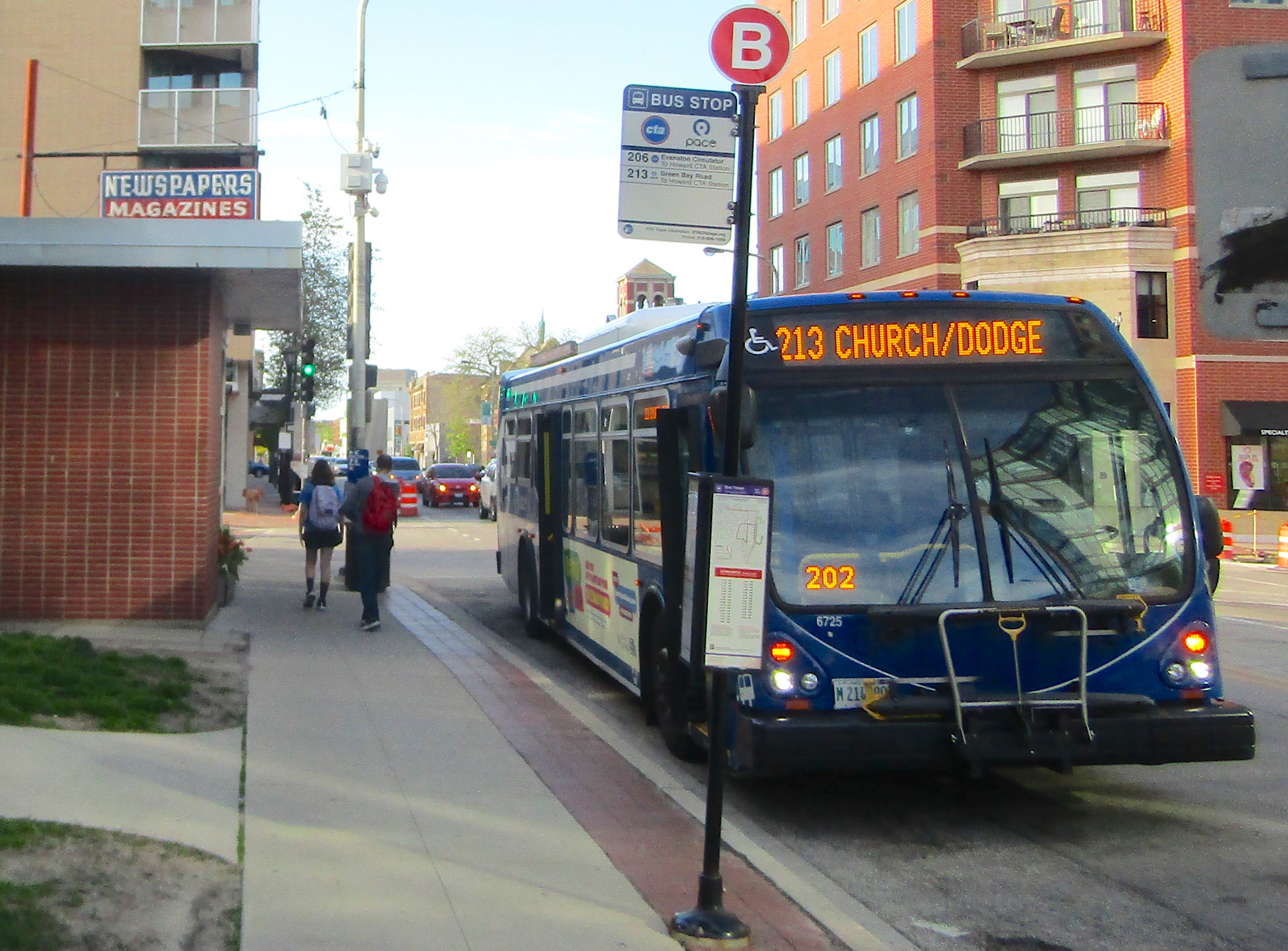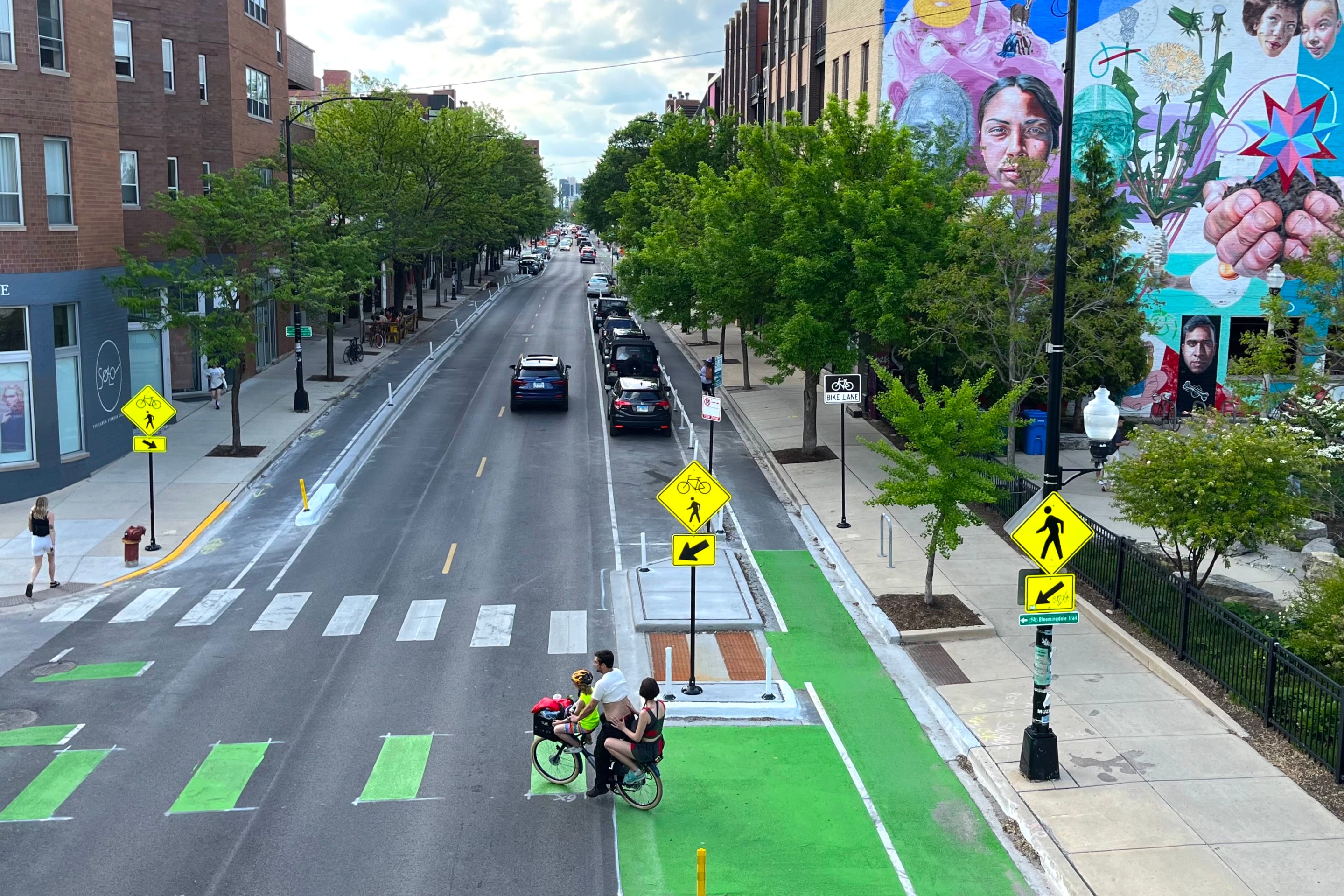Having police crack down on minor transit infractions doesn’t make us safer
6:10 PM CDT on March 11, 2020
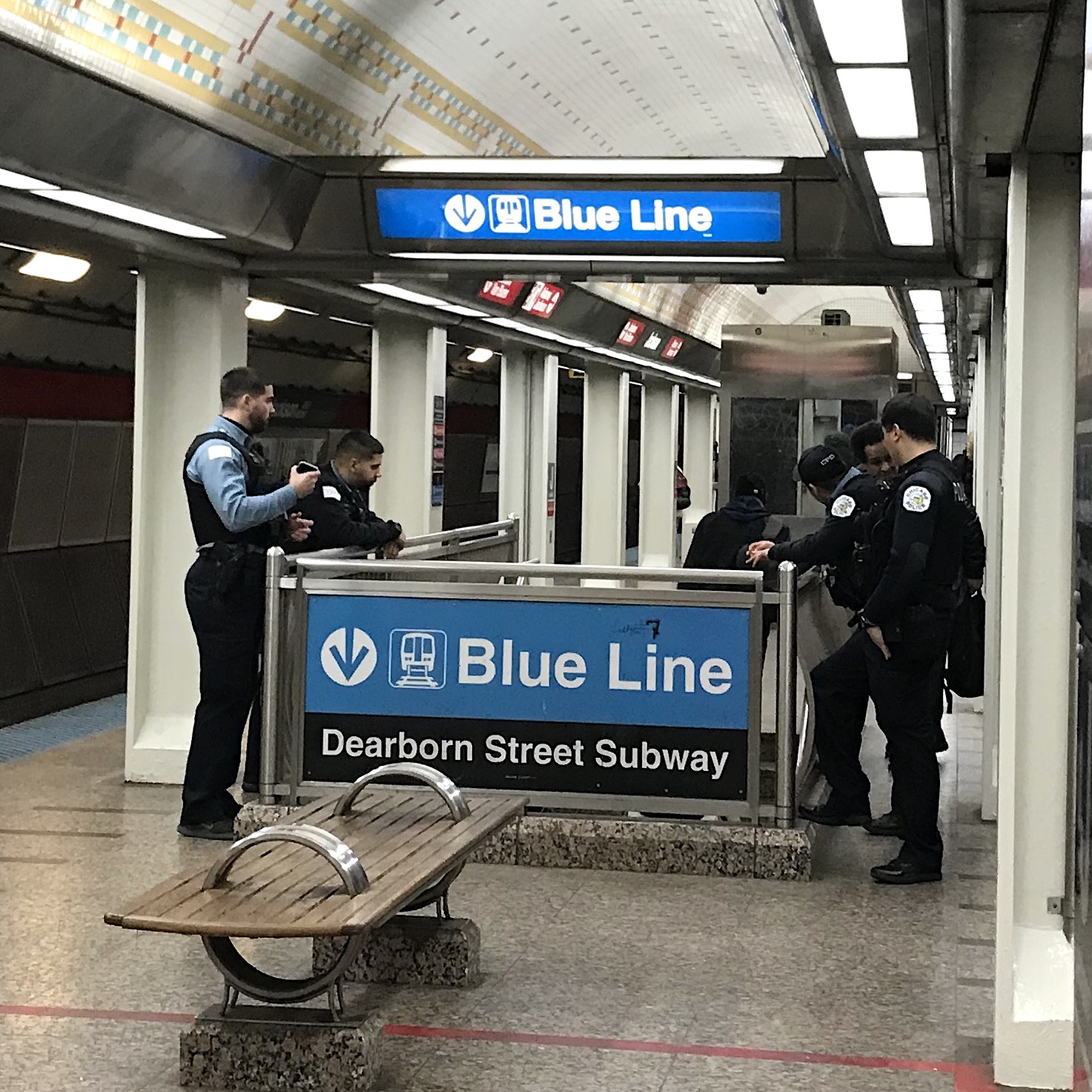
Police at the Jackson Red Line platform. Photo: John Greenfield
Update 3/12/20 9 AM: CTA police shooting victim Ariel Roman has filed a federal lawsuit agains the city of Chicago and the two officers who shot him, alleging that he was suffering from an anxiety attack when he was “harassed, chased, tackled, pepper-sprayed, tasered and shot twice.”
Sadly, Chicago's wave of violent crime on the CTA shows no sign of of stopping. High-profile cases so far this year have included the stabbing of a musician on the Jackson Red platform on February 4; the shooting of a man on the Blue Line near the UIC/Halsted stop on February 5; and the fatal shooting of Edward Charleston, 24, on February 17 in the tunnel between the Jackson Red and Blue platforms.
More recently, on Sunday, March 8, at 9:15 p.m., a male punched a female passenger multiple times on a CTA bus at Madison Street and Hoyne Avenue on the Near West Side and ran off with her iPhone. And on Tuesday, March 10, at about 6 p.m., following an altercation, a male stabbed another male in the hip, once again at the Jackson Red Line stop.
In light of these cases, plus many other violent robberies since December, it's understandable that some people feel that more policing of the system is needed. On February 28, Mayor Lori Lightfoot and interim police chief Charlie Beck announced that the city would be adding 50 new officers to the Chicago Police Department’s public transportation unit, in addition to several hundred officers who were already patrolling the CTA. Earlier that month SWAT officers in green uniforms were deployed on the system.
In Streetsblog's coverage of Lightfoot's announcement, we noted that over-policing of transit systems in New York City and Los Angeles has had some major negative impacts. New York has seen massive protests after a saturation-policing strategy to reduce fare evasion resulted in widespread arrests of low-income people of color for nonpayment, as well as crackdowns on other minor infractions like unlicensed food vending.
In Los Angeles, data released as part of an inquiry into possible civil rights violations by LA Metro showed that while African Americans made up only about 19 percent of rail ridership, they represented almost 60 percent of arrests. and in one tragic incident, a young man was tackled by police after being stopped for fare evasion, which led to him being crushed to death by an incoming train.
The very afternoon that Lightfoot announced the policing plan, fears about over-policing of the CTA were realized. Police tried to detain Ariel Roman, a 33-year-old cook, after they saw him illegally walking between train cars. That led to them pepper spraying, Tasing, and recklessly shooting up a Grand Avenue Red Line station escalator at the unarmed man as he tried to flee the arrest. Roman, who is Latino, was shot twice in the buttocks and abdomen.
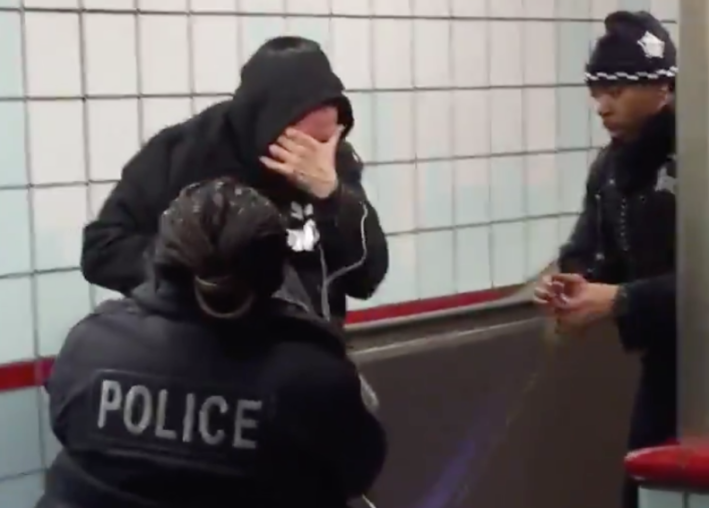
Thankfully, Roman's sister posted last week on a GoFundMe page that he had eaten his first bite of food since the shooting, and that emails from well-wishers were lifting his spirits. "It really made him smile that so many people care about him and are rooting for him to get better."
In a blog post last week, the Active Transportation Alliance's Julia Gerasimenko noted that it's unclear if there was any input from community members or CTA workers on the city's policing plan. "The police shooting at the Grand Red Line is a pressing example of why Chicago must develop alternatives to policing and criminalization to keep our trains and buses safe," she wrote. "These alternatives should be developed through a robust community-led process that prioritizes racial equity and centers the voices of people most impacted by the issue."
"More armed officers on buses and trains doesn’t make everyone feel safe and puts Black and Brown transit riders at greater risk," Gerisamenko added. "The legacy of racist and discriminatory policing in Chicago can’t be ignored on our transit system."
She discussed possible non-police solutions for improving safety and equity such as de-criminalizing fare evasion, so that non-payment results in a ticket, rather than a night in jail. She also cited a pilot project on the San Francisco area's BART system in which 30 unarmed “transit ambassadors” trained in de-escalation and anti-bias techniques have been deployed on the system to address safety concerns.
Streetsblog Chicago previously floated the idea of bringing back CTA conductors, a position that was eliminated in 1998 to cut costs, to deter crime and encourage compliance with rules against smoking and other quality-of-life violations. The conductors could also do constructive outreach to the many homeless people who currently shelter on the CTA, helping to connect them with housing and healthcare resources. Staff from the social service agency Thresholds are already doing this kind of outreach, but it would be great to have a constant presence on trains at night across the system.
Today Active Trans joined the Amalgamated Transit Union, Chicago Jobs with Justice, the Chicago Coalition for the Homeless, and the Illinois Coalition for Immigrant and Refugee Rights in calling on the city to protect both CTA customers and employees without over-policing the system.
“We understand and appreciate the mayor’s desire to act quickly in response to a spike in crime on the CTA," said Ken Franklin, president of ATU Local 308, in a statement. "However, we had a tragic example on Friday, February 28, of why adding SWAT teams and CPD officers is not the best solution to truly making our transit system safe. Their presence does not guarantee our safety and can actually pose additional risks.”
“What we need is increased safety personnel on the trains and buses that can de-escalate and problem-solve," said Keith Hill, President of ATU Local 241 in a statement. "We need CTA workers to replace SWAT teams and police, and to be trained in non-lethal tactics so our operators can focus on getting people safely to their destination.”
The groups are currently lobbying for state legislation to improve the training and number of CTA workers to serve as safety personnel on transit. They argued that this would not only be a better safety strategy, but it would also be less expensive than hiring SWAT teams and police. They also called for more funding for homeless and mental health services to help reduce the need for people to seek shelter on trains, and noted that the presence of SWAT officers on the CTA will sow confusion and fear during a time when the Trump administration is cracking down on undocumented immigrants.
In the short term, city officials can help prevent more incidents like the Ariel Roman shooting, as well as reduce distrust and resentment of the police, by requiring officers patrolling CTA to focus on deterring and responding to serious crime, not cracking down on petty infractions. For example, since the Jackson Red stop appears to be a hot spot for violence, it makes some sense that the CPD has regularly stationed officers there in recent weeks (although that didn't prevent yesterday's stabbing.)
But, as we saw with the Roman case, every time an armed authority figure tries to detain a person for a minor offense, there's the potential for the situation to escalate into violence. Yesterday a Streetsblog reader told us that "police checked photos on RTA reduced ride and U-pass cards at the Belmont Red/Brown 'L' station this Monday," requiring people using the passes to show an ID to prove that they were entitled to use the fare cards.
how much do you think they're paying the cops to make sure nobody skips out on $2.50? how many people do you think the CPD will shoot over a borrowed fare card? pic.twitter.com/x4TRm3mWcv
— LEVELLER (@LEVELLERcomms) March 10, 2020
According to a CTA spokesperson, since 2014 the agency has been conducting sporadic checks to prevent reduced fare card fraud, but they said that unarmed security guards, not police officers do the checks. If the user's ID doesn't match the name on the card, the card is supposed to confiscate the card, and the user would need to contact the Regional Transit Authority, which administers the free/reduced-fare program, to get reinstated.
However, the person who reported Monday's fraud-prevention check said they were certain that police officers were present. The CTA spokesperson responded, "Belmont is a busy station that often has officers [but] CPD officers were not involved with the fare card checks." Still, if a reduced-fare card user refused to surrender their card, it's likely that the police would step in, which could easily escalate into a dangerous situation. Moreover, there's the question of whether the amount of money the CTA saves by conducting these checks actually merits paying security guards to conduct them, as well as the inconvenience to customer of being forced to show an ID.
Ariel Roman's family has already retained a lawyer, and it's likely that the city of Chicago will have to pay a major settlement to Roman for the unjustified shooting. So while it's clear that crackdowns on minor CTA rule-breaking are counterproductive from a public safety and social justice perspective, they also make no sense from from a a strictly financial standpoint.
In addition to editing Streetsblog Chicago, John writes about transportation and other topics for additional local publications. A Chicagoan since 1989, he enjoys exploring the city on foot, bike, bus, and 'L' train.
Stay in touch
Sign up for our free newsletter
More from Streetsblog Chicago
Elevated Chicago’s new leader on how to build more support for equitable transit-oriented development
Recently announced as executive director Juan Sebastian Arias also shared his POV on Mayor Johnson's Cut the Tape initiative to speed up the development approval process
Since COVID, Pace ridership has fared better on major corridors and in north, northwest suburbs than in south, west ‘burbs
The suburban bus system's top five busiest routes largely maintained their ridership rankings.
Due to incredible support from readers like you, we’ve surpassed our 2023-24 fundraising goal
Once again, the generosity of walk/bike/transit boosters is fueling our reporting and advocacy.
